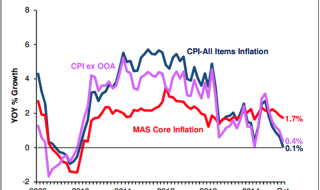
We frequently hear of the word “economics” in papers or conversations, but how useful or applicable is this course of study to the real world?
Understanding economics is in reality fundamental to understanding the price movements of every single good and service in our economy. It is the aggregation of the demand and supply forces. Indeed, when we see the airfare skyrockets after the end of school term, it is economics at work. Huge travel demand outweighing limited supply of passenger seats leads to propped up prices. As such, appreciating and capitalising on economic knowledge could end you up in deeper pockets.
While it may be too time consuming and superfluous to master all the economic theories, knowing a few essential concepts may come in handy in guiding our financial and behavioral decisions.
- Inflation and savings

(Image credit: http://inflationdata.com)
Thanks to the prudent policies administered by MAS, Singapore enjoys a low inflation rate of 2.8% on average since 1962. However, a simple comparison between the interest rates offered by various banks indicates a mere 1.3% as the most competitive rate for 1-year fixed deposits.
What this means: The fund sitting in your bank is losing 1.5% of its value to be exchanged into goods and services annually. Given that you have $100 in your bank today, you can afford to buy 50 McChicken burgers. But one year down the road, you can only afford to purchase 49.25 of them.
Course of actions to be taken: Since the saving rate is not commensurate with the inflation rate, we may be better off investing in alternative assets that provide higher yields. However, if every rational and irrational soul is doing that, risks abound as illustrated below.
- Stock investment

(Image credit: thenest.com)
Investing in stocks can yield 2 kinds of returns, namely dividend yield and capital gains yield. The former tends to be more predictable than the latter, especially if the company holds a long term track record of constant or growing dividend stream.
How to value stocks: Dividend yield is an objective measure in guiding investment decisions since they are realised returns and a better indicator of future returns. On the other hand, be extra cautious during stock encounters with historically impressive capital appreciation. Gullible investors may be tempted to buy these shares as they often fail to realise the high variability of capital gains yield could be complicated by the problem of information asymmetry where insiders possess and exploit private information to the disadvantage of outsiders.
Course of actions to be taken: Both insiders and outsiders have to keep abreast of news and developments in the macroeconomy and international economies as they affect stock returns systemically.
Specifically for outsiders, it is crucial to have a good grasp of the economic fundamentals (such as the consistency of dividend payouts and growth potential) of the company that helps to steer towards a proper valuation. A long term investment horizon is more favourable as it puts them on a more level ground with the insiders. If the outsiders were to invest in the short term, speculation is usually involved since by definition, the fact that they do not possess the superior private knowledge is prejudicial to them.
- Property investment

(Image credit: http://www.sydneyaccountants.com)
For more well-heeled investors looking to diversify their portfolio, real estate investment seems the way to go. Similarly, real estate assets provide 2 types of returns, specifically rental yield and capital gains yield. Best of all, a residential property provides its owner(s) a physical shelter to live in. Despite these benefits though, investors should be wary of overpaying for homes.
How to value property: Rental yield is an objective measure in guiding investment decisions since it measures the payback period of the hefty mortgage loan that homebuyers commit to. The URA Masterplan and a concise understanding of demographics are vital tools in predicting the capital gains yield.
Course of actions to be taken: Beware of one-off anomalous sale transactions that are not reflective of the true market forces. Stay out of homes in which the overinflated prices are not underpinned by strong economic fundamentals (such as location, amenities and size). Buy during a recessionary period instead of an inflationary period. Timing the market makes an enormous difference in your bank account.
- Employment

(Image credit: http://www.personneltoday.com)
Investments aside, most of us contribute to the economy through our employment. But to maximise the return on our faculties and time, insights have to be drawn from the demand and supply forces.
Some simple mathematics to gauge how financially rewarding is a particular industry: If the staff turnover is high (due to long working hours, poor welfare, unchallenging job roles etc.), companies should offer higher wages to attract or retain workers.
However, this is not happening. Reason being a ready supply of potential (local and foreign) employees provides virtually no impetus for corporations to raise salaries. Does this plight sound familiar?
Course of actions to be taken: Instead of complaining about meagre wages, pursue a career in an alternative industry with market dynamics (i.e. less competition) working in your favour. Although it may seem counter-intuitive, you actually build greater wealth bucking the norm and doing what others don’t do. Better still, venture into a new industry and gain the first mover advantage.
Now you see, having a good understanding of economics is useful in our day-to-day living as it forms an integral basis for making financially sound decisions.




